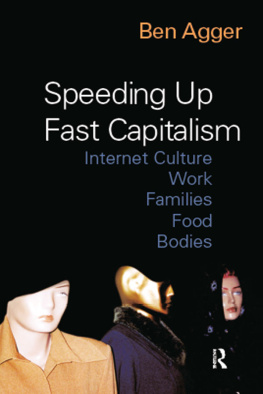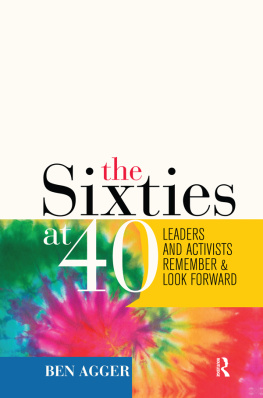Agger - Speeding Up Fast Capitalism
Here you can read online Agger - Speeding Up Fast Capitalism full text of the book (entire story) in english for free. Download pdf and epub, get meaning, cover and reviews about this ebook. year: 2015, publisher: Taylor and Francis, genre: Politics. Description of the work, (preface) as well as reviews are available. Best literature library LitArk.com created for fans of good reading and offers a wide selection of genres:
Romance novel
Science fiction
Adventure
Detective
Science
History
Home and family
Prose
Art
Politics
Computer
Non-fiction
Religion
Business
Children
Humor
Choose a favorite category and find really read worthwhile books. Enjoy immersion in the world of imagination, feel the emotions of the characters or learn something new for yourself, make an fascinating discovery.
Speeding Up Fast Capitalism: summary, description and annotation
We offer to read an annotation, description, summary or preface (depends on what the author of the book "Speeding Up Fast Capitalism" wrote himself). If you haven't found the necessary information about the book — write in the comments, we will try to find it.
Agger: author's other books
Who wrote Speeding Up Fast Capitalism? Find out the surname, the name of the author of the book and a list of all author's works by series.
Speeding Up Fast Capitalism — read online for free the complete book (whole text) full work
Below is the text of the book, divided by pages. System saving the place of the last page read, allows you to conveniently read the book "Speeding Up Fast Capitalism" online for free, without having to search again every time where you left off. Put a bookmark, and you can go to the page where you finished reading at any time.
Font size:
Interval:
Bookmark:
SPEEDING UP FAST CAPITALISM
CULTURES, JOBS, FAMILIES, SCHOOLS, BODIES
BEN AGGER

First published 2004 by Paradigm Publishers
Published 2016 by Routledge
2 Park Square, Milton Park, Abingdon, Oxon OX14 4RN
711 Third Avenue, New York, NY 10017, USA
Routledge is an imprint of the Taylor & Francis Group, an informa businesss
Copyright 2004, Taylor & Francis.
All rights reserved. No part of this book may be reprinted or reproduced or utilised in any form or by any electronic, mechanical, or other means, now known or hereafter invented, including photocopying and recording, or in any information storage or retrieval system, without permission in writing from the publishers.
Notice:
Product or corporate names may be trademarks or registered trademarks, and are used only for identification and explanation without intent to infringe.
Library of Congress Cataloging-in-Publication Data
Agger, Ben.
Speeding up fast capitalism : cultures, jobs, families, schools, bodies / Ben Agger.
p. cm.
Includes bibliographical references and index.
ISBN 1-59451-032-6 (hardcover : alk. paper)ISBN 1-59451-033-4 (pbk. : alk. paper)
1. Information society. 2. TimeSociological aspects. 3. SelfSocial aspects. I. Title.
HM851.A337 2004
303.484dc22
2004002210
Designed and Typeset by Straight Creek Bookmakers.
ISBN 13 : 978-1-59451-032-8 (hbk)
ISBN 13 : 978-1-59451-033-5 (pbk)
Contents
Chapter 1
Faster Capitalism?
Chapter 2
Domination at the Speed of Light
Chapter 3
The Omnipresence of Work
Chapter 4
Fast Families and Virtual Children
Chapter 5
Fast Food, Fasting Bodies
Chapter 6
Slowmodernity
About the Author
I hear voices from the past, from the sixties, when a seed was planted. The voices are getting louder.
I had to be dragged into the twenty-first century kicking and screaming. I liked my dads old Royal typewriter, and I thought that the Internet was overhyped. I dismissed people who extolled information and communication technologies as the latest generation of technological utopians. I didnt get that capitalism was bending the Internet to its purposes, much as it bent radio, television, moviesthe culture industry.
A decade after I published Fast Capitalism in 1989, I began to theorize the Internet as an important moment of post-Fordist, postmodern capitalism. This act of theorizing needed not only to stress the enveloping, dominating characteristics of these phenomena but also to identify their dialectical potential for undoing the existing social orderwhat Petrini calls slow life. I realized that I had opened the way for this theorizing in my earlier book, which identified the flimsy boundary between texts and the world as an important topic for contemporary critical theory. I interpret this deboundarying as a cause of the decline of discourse. I hope that this decline can be reversed by writing books, such as this sequel to Fast Capitalism, that both belong to and address the public sphere.
Initially I approached Dean Birkenkamp about reissuing Fast Capitalism in a new edition. He patiently explained that second editions of recondite works dont fare well in the literary marketplace and instead he suggested writing a new take on fast capitalism, which has become faster since the late 1980s. I owe the idea for this book to Dean, who, as always, helps his authors shape their projects imaginatively. Working with Dean is like working with a trusted coauthor.
I am also grateful to Julie Kirsch for doing an outstanding copyedit of the manuscript.
Many of my insights are derived from the everyday life I share with Beth Anne, Sarah, and Oliver as we traverse the early twenty-first century. I vividly recall certain landmarks in our family life that influence the way I see things: Our trip to Paris; 9/11, when my kids were at school and learned of the events; the day I realized that my kids had stopped wanting to go McDonalds. We all work hard to slow things down, recognizing that carefree childhood is a metaphor for, and an opening to, the good society.
Faster Capitalism?
The doorbell just rang. It was the mailman bringing a package from Amazon.com. In our suburb between Fort Worth and Dallas, good bookstores are hard to find. There is the obligatory Barnes & Noble outlet, where you can order a book with your cappuccino or calendar. But there is nothing in the way of an independent, intellectual bookstore of the kind we used to enjoy in Buffalo and nearby Ithaca. So we order from Amazon. Todays book is called Wired to the World, Chained to the Home by Canadian social scientist Penelope Gurstein (1991).
Canada figures in this story. One of my main themes is the way that distance (as opposed to immersion) affords clarity of vision. Here, distance is Canada. A host of Canadian scholars and writers, from Harold Innis, Marshall McLuhan, and George Grant to John ONeill, Douglas Coupland, and Arthur Kroker have addressed the impact of rapid information and communication on self, society, and culture. McLuhan coined the term global village and Coupland the term Generation X. Perhaps Canadian theorists are well positioned to understand the inextricable connection between culture and power; after all, Canada exists in the shadow of America and yet it shuns superpower politics and identity. Canadians are also keenly aware of the importance of boundaries.
The other thing that happened today is that I finished writing The Virtual Self (2004), a book about the impact of the Internet. Instead of sending a pulp copy of the manuscript to the publisher, I simply e-mailed files across the country. The publishing house is based in England, but it operates internationally. The book was signed and developed in the United States, typeset in India, and printed and bound in the United Kingdom. Virtuality is the question of the day, indeed of the year and perhaps of the decade. Critical social theorists are scrambling to make sense of new information technologies just as we use these technologies to order books and write them. Speeding Up Fast Capitalism, a sequel to Fast Capitalism (Agger 1989a) in light of the Internet, doesnt simply reflect the world but is implicated in that world. As I explain in The Virtual Self, I am not antitechnology or antiinformation technology; I use technology, but it also uses me in ways that give me pause to consider it theoretically. I sometimes use a cell phone, fax machines, pagers, the television, of course, and courier services (the Amazon book), all of the accouterments of an industrial civilization that some call post-Fordistbeyond the era of Henry Fords mass production. An excellent book on this post-Fordist world is Dyer-Withefords Cyber-Marx (1999).
Fast capitalism is a term I coined in 1989 to describe a new stage of social development. The term has found its way into the theoretical discourse; recently, a scholar published a book with Princeton University Press using the term fast capitalism in the title (Holmes 2000). When I published Fast Capitalism with University of Illinois Press, I had just taken delivery of a computer in my faculty office at SUNY-Buffalo. Ive been a typist since the eighth grade, and this IBM PC, as I recall, was a useful addition to my intellectual technology. But even in the late 1980s, as I thought through my argument about a new stage of capitalism called fast, I could only dimly imagine what was to come in the subsequent decade as the Internet and World Wide Web colonized the planet, changing the way we start our days (with e-mail), communicate (e-mail, again, and chat), learn about and teach the world (Web pages), entertain and stimulate ourselves, shop and travel, and make intellectual contacts. This book describes how a fast capitalism has gotten even faster, and it traces the implications of all this for culture, work, schooling, childhood, diet, and bodies. You dont have to be a social theorist to read this book productively. I will summarize and update the argument of my earlier book in this first chapter and then apply these insights to a host of human and social issues.
Next pageFont size:
Interval:
Bookmark:
Similar books «Speeding Up Fast Capitalism»
Look at similar books to Speeding Up Fast Capitalism. We have selected literature similar in name and meaning in the hope of providing readers with more options to find new, interesting, not yet read works.
Discussion, reviews of the book Speeding Up Fast Capitalism and just readers' own opinions. Leave your comments, write what you think about the work, its meaning or the main characters. Specify what exactly you liked and what you didn't like, and why you think so.








